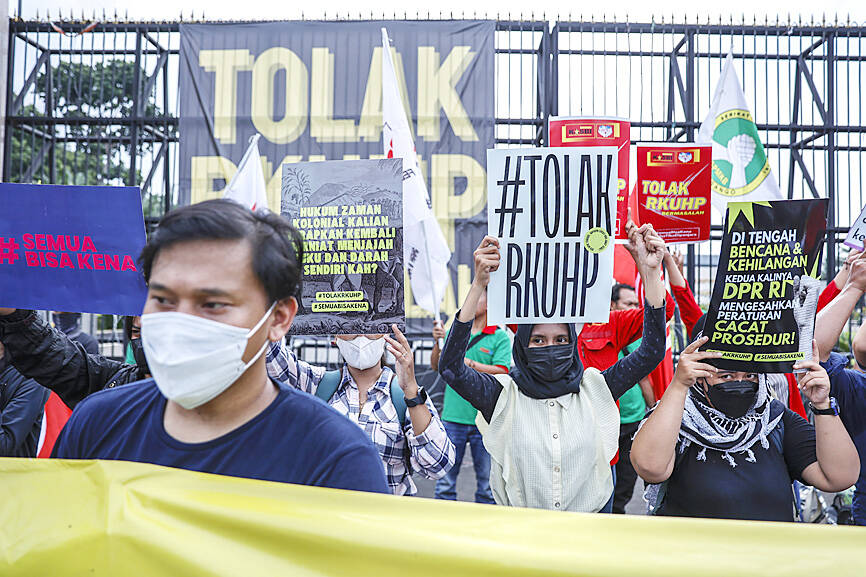Indonesia is expected to ratify sweeping changes to its criminal code today, senior officials confirmed, in a legal overhaul that critics say could wind back hard-won democratic freedoms and police morality in the Southeast Asian nation.
Among the most controversial revisions to the code are articles that would penalize sex outside of marriage with up to one year in jail, outlaw cohabitation between unmarried couples, insulting the president and expressing views counter to the national ideology, known as the Pancasila.
Indonesian Second Deputy Speaker of the People’s Representative Council Sufmi Dasco Ahmad and Bambang Wuryanto, head of the legislative commission overseeing the revision, yesterday said that parliament would hold a plenary session today to ratify the new code.

Photo: EPA-EFE
The government and People’s Representative Council have agreed on the draft code, clearing a hurdle to its passage.
Decades in the making, the revision of the country’s colonial-era penal code has sparked mass protests in the past few years, although the response has been considerably more muted this year.
Parliament had planned to ratify a draft new code in September 2019, but nationwide demonstrations over perceived threats to civil liberties halted its passage.
Legislators in the world’s third-largest democracy have since watered down some of the articles deemed most contentious.
Revised articles on sex outside marriage and cohabitation, for example, now state such complaints can only be reported by close relatives such as a spouse, parent or child, while insulting the president can only be reported by the president.
Legal experts and civil society groups say the changes do not go far enough.
“This criminal code is a huge setback for Indonesia,” said Bivitri Susanti, a law expert from the University of Indonesia.
“The state cannot manage morality,” she said. “The government’s duty is not as an umpire between conservative and liberal Indonesia.”
Articles on customary law, blasphemy, protesting without notification and expressing views divergent from the Pancasila were all legally problematic because they could be widely interpreted, she said.
Once ratified, the new code would come into effect after three years as the government and related institutions draft related implementing regulations.

Kehinde Sanni spends his days smoothing out dents and repainting scratched bumpers in a modest autobody shop in Lagos. He has never left Nigeria, yet he speaks glowingly of Burkina Faso military leader Ibrahim Traore. “Nigeria needs someone like Ibrahim Traore of Burkina Faso. He is doing well for his country,” Sanni said. His admiration is shaped by a steady stream of viral videos, memes and social media posts — many misleading or outright false — portraying Traore as a fearless reformer who defied Western powers and reclaimed his country’s dignity. The Burkinabe strongman swept into power following a coup in September 2022

‘FRAGMENTING’: British politics have for a long time been dominated by the Labor Party and the Tories, but polls suggest that Reform now poses a significant challenge Hard-right upstarts Reform UK snatched a parliamentary seat from British Prime Minister Keir Starmer’s Labor Party yesterday in local elections that dealt a blow to the UK’s two establishment parties. Reform, led by anti-immigrant firebrand Nigel Farage, won the by-election in Runcorn and Helsby in northwest England by just six votes, as it picked up gains in other localities, including one mayoralty. The group’s strong showing continues momentum it built up at last year’s general election and appears to confirm a trend that the UK is entering an era of multi-party politics. “For the movement, for the party it’s a very, very big

ENTERTAINMENT: Rio officials have a history of organizing massive concerts on Copacabana Beach, with Madonna’s show drawing about 1.6 million fans last year Lady Gaga on Saturday night gave a free concert in front of 2 million fans who poured onto Copacabana Beach in Rio de Janeiro for the biggest show of her career. “Tonight, we’re making history... Thank you for making history with me,” Lady Gaga told a screaming crowd. The Mother Monster, as she is known, started the show at about 10:10pm local time with her 2011 song Bloody Mary. Cries of joy rose from the tightly packed fans who sang and danced shoulder-to-shoulder on the vast stretch of sand. Concert organizers said 2.1 million people attended the show. Lady Gaga

SUPPORT: The Australian prime minister promised to back Kyiv against Russia’s invasion, saying: ‘That’s my government’s position. It was yesterday. It still is’ Left-leaning Australian Prime Minister Anthony Albanese yesterday basked in his landslide election win, promising a “disciplined, orderly” government to confront cost-of-living pain and tariff turmoil. People clapped as the 62-year-old and his fiancee, Jodie Haydon, who visited his old inner Sydney haunt, Cafe Italia, surrounded by a crowd of jostling photographers and journalists. Albanese’s Labor Party is on course to win at least 83 seats in the 150-member parliament, partial results showed. Opposition leader Peter Dutton’s conservative Liberal-National coalition had just 38 seats, and other parties 12. Another 17 seats were still in doubt. “We will be a disciplined, orderly